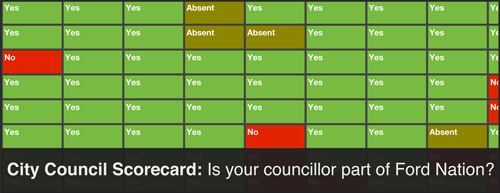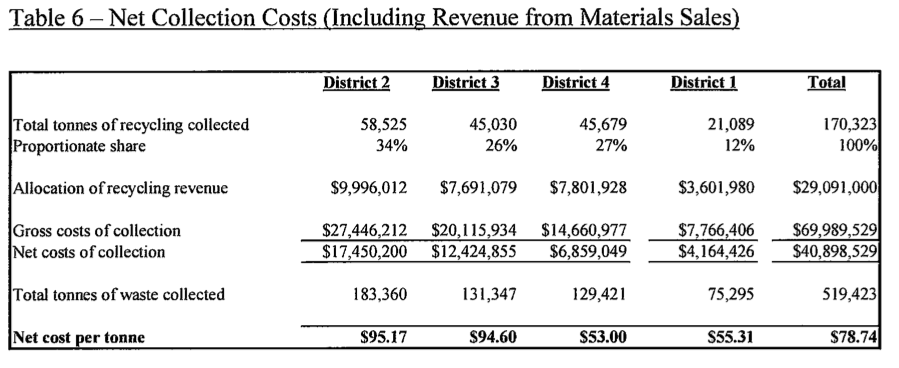November 24, 2011: Google Docs (Best View) - Download (PDF)  - Download (PNG)
A bit delayed this month because despite all the hoopla over animals and garbage, the October council meeting actually ended up being fairly uneventful. Especially when compared to the September special meeting, which was full of dramatic and close votes.
Have no fear, though: things are about to ramp up again. We’re just about to enter the 2012 budget season — all this core service review stuff is little more than a pre-show — where everything is likely to descend into outright chaos.
But first, let’s wrap up October by adding the vote on the contracting out of solid waste — a major Rob Ford campaign promise — to the City Council Scorecard.
New Vote
- CC13.5Â awarded, amongst other things, the contract for solid waste collection in District 2 to Green For Life, an upstart player in the waste collection industry with a lightly checkered past and a bid that some felt was suspiciously low. Council voted 32-12 earlier this year to put the contract out to tender and, given that GFL’s bid was ruled compliant, it would have put Council in a legally dicey position had they rejected the bid. Also of note: we learned this morning with the release of Council’s agenda for next week that GFL entered into a process to acquire Turtle Island Recycling Corporation — the holder of the contract for waste collection in District 1 — on July 28, 2011, several months prior to this vote. As a result of their successful acquisition, GFL will control solid waste pick-up for half of Toronto as of next August.
Trend Watch
Not a lot to read into with this vote. Given council’s legal position and the fact that this is one of those things that Ford can legitimately claim a mandate, there was no way this vote was going to see a different result.
More interesting was a motion by Ana Bailão, who moved that council defer making a decision on the contract until the November council meeting, to allow for more consultation with the union and a more through examination of the bid. Her motion failed 20-22, with Raymond Cho, Chin Lee, Mary-Margaret McMahon Josh Matlow and the 16 councillors who ultimately voted against the contract in support.
Bailão continues to chart away from the mayor and his agenda, which seems to be making some unhappy. The Sun’s Sue-Ann Levy savaged her in a column after the vote. Bailão should be proud.
Batting Average
Ford’s council batting average ticks up as a result of this victory, after plunging in September with a series of defeats on items relating to the core service review. But this was always a gimme. Regardless of the social or economic cost in the long-term, voters wanted some revenge for the 2009 public worker strike. In this, I guess they have it. What happens next is anyone’s guess.
Questions
Questions about the Council Scorecard? Read my notes on methodology. Also, you can email me.



